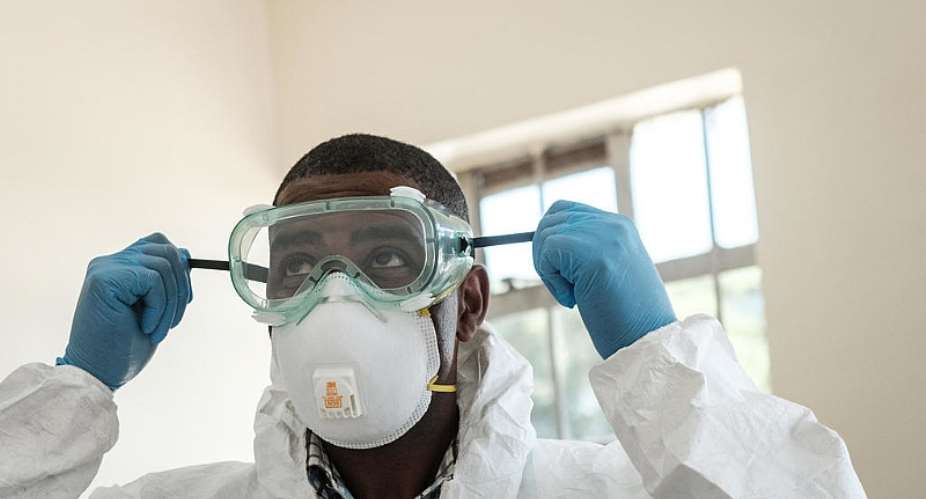The African region is the hardest hit by trade restrictions limiting the flow of goods used in the fight against the coronavirus, according to a report published this week. On the contrary, African countries export many of the materials used for producing masks, gloves and disinfectants that could instead be used for their own manufacturing.
“74 percent of African imports of Covid-19 related products are subject to bans or restrictions,” the International Trade Centre (ITC) said in a report.
The fight against the coronavirus pandemic left many countries across the world scrambling to secure vital equipment used to help stop the spread of the virus and protect frontline healthcare workers.
Some countries restricted exports of certain medical goods, or had permission schemes or licensing that made it more difficult for importing countries to secure essential supplies.
ITC analysed the trade data on disinfectants, sterilizers, medical consumables, test kits, medical and surgical equipment, personal protective equipment (PPE) and oxygen therapy equipment.
The agency, which works on behalf of the UN and World Trade Organisation, judged that the share of Covid-19-related imports affected by restrictions were “highest in Africa”, according to the ITC report published on Monday.
“Some regions have been hit harder than others by trade limits on Covid-19-related products,” the report added. “Few African countries restrict exports of goods related to Covid-19, largely attributable to the fact that they do not manufacture them.”
Africa could produce its own
Countries on the African continent could become self-sufficient in its own virus-related products, notably masks, gloves and disinfectants, according to the ITC.
The regional exports of these products are not enough to meet the needs of African frontline healthcare workers, but the inputs or materials needed to manufacture these medical goods are present on the continent to develop supply chains.
Medical or surgical gloves mostly use latex and many countries on the African continent have a considerable supply of rubber they sell abroad, but few finished gloves are exported.
“Cote d'Ivoire and Cameroon already export surgical gloves, but African demand exceeds supply. By using 6 percent of their monthly latex exports, the two countries could produce the 13 million gloves that African health responders need each month to face Covid-19,” the report outlined.
Liberia, Ghana and Nigeria also export latex, but do not export any surgical gloves, according to ITC data.
It is a similar story for filtered masks, the most sophisticated type of facemask healthcare workers need to protect themselves against the spread of Covid-19, stopping the droplets transmitting the virus.
The African continent exports 3.5 percent of the world's supply of synthetic nonwoven fabrics used in filtered masks, yet production of these masks on the continent is limited.
By allocating 7 percent of its synthetic nonwoven fabrics for manufacture in Africa, countries could fulfil their own monthly requirement, eradicating the need for imports, the report estimated.
ITC outlined a similar example for disinfectants since the required ethanol and plastic bottles are already abundant in African countries, notably manufactured in Egypt and South Africa. Glycerine, the other ingredient needed for disinfectants, is not produced in enough quantity locally but could be sourced globally.
Free trade zone
Wamkele Mene, secretary general of the African Continental Free Trade Area (AfCFTA), said African businesses can in the future capitalise on the lack of manufacturing of medical goods that Covid-19 has highlighted.
“The AfCFTA Secretariat encourages member states to turn this crisis into an opportunity by redeploying their production so there is an extraordinary increase in the fabrication of drugs, personal protective equipment, soap, hand sanitizers, intensive care unit beds, testing kits and even ventilators,” Mene said in an op-ed published in the report.
Covid-19 forced a delay in implementing the continent's free trade zone, potentially one of the world's largest free trade blocs, that had been set for 1 July. Mene has said he hopes the agreement could come into force at the start of 2021.
Mene said the coronavirus pandemic and associated economic downturn should “provide a powerful rationale for the immediate implementation of AfCFTA, as a vehicle to spur economic growth and build resilience across the continent”.





 Meta releases new version of conversational AI across its platforms
Meta releases new version of conversational AI across its platforms
 Cape Town named Africa’s Best Airport 2024 by Skytrax
Cape Town named Africa’s Best Airport 2024 by Skytrax
 Bono East: Four injured after hearse transporting corpse crashes into a truck
Bono East: Four injured after hearse transporting corpse crashes into a truck
 ‘Be courageous, find your voice to defend our democracy’ — Sam Jonah urges journ...
‘Be courageous, find your voice to defend our democracy’ — Sam Jonah urges journ...
 Exodus of doctors, nurses and teachers have worsened because of unserious Akufo-...
Exodus of doctors, nurses and teachers have worsened because of unserious Akufo-...
 2024 election: Avoid insults, cutting down people in search of power – National ...
2024 election: Avoid insults, cutting down people in search of power – National ...
 ‘You passed through the back door but congratulations’ — Atubiga on Prof Jane Na...
‘You passed through the back door but congratulations’ — Atubiga on Prof Jane Na...
 Government’s $21.1 billion added to the stock of public debt has been spent judi...
Government’s $21.1 billion added to the stock of public debt has been spent judi...
 Akufo-Addo will soon relocate Mahama’s Ridge Hospital to Kumasi for recommission...
Akufo-Addo will soon relocate Mahama’s Ridge Hospital to Kumasi for recommission...
 We must not compromise on our defence of national interest; this is the time to ...
We must not compromise on our defence of national interest; this is the time to ...
